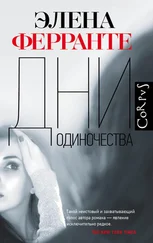“Would you do me a very small favor?”
“Yes.”
“Would you take off the bracelet? The girls don’t know I gave it to you.”
“Maybe everything would be less complicated if you told the truth.”
She said haltingly:
“The truth is difficult, growing up you’ll understand that, novels aren’t sufficient for it. So will you do me that favor?”
Lies, lies, adults forbid them and yet they tell so many. I nodded, unhooked the bracelet, put it in my pocket. She thanked me, we went into the house. I saw Angela again after such a long time, I saw Ida, we quickly found a semblance of friendship, even if all three of us were very changed. You’re so thin, Ida said, your feet are so long, and what big breasts you have, yes, they’re very big, and why are you all dressed in black?
We ate in a sun-filled kitchen, with sparkling furniture and appliances. We three girls began to joke, I got the giggles, and Costanza, seeing us, seemed relieved. Every trace of her tears had disappeared, she was so nice that she concerned herself more with me than with her daughters. At one point, she chided them because they were excitedly telling me in minute detail about a trip to London with their grandparents and wouldn’t let me get a word in. The whole time she looked at me kindly, twice she whispered in my ear: I’m so happy you’re here, what a pretty girl you’ve become. What does she want, I wondered. Maybe she wants to take me away from my mother, too, wants me to come and live in this house. Would I mind? No, maybe not. It was big, very light, full of luxuries. Almost certainly I would be comfortable, if my father didn’t sleep, eat, go to the bathroom in that space exactly as he had done when he lived with us on San Giacomo dei Capri. But that was precisely the obstacle. He lived there, and his presence made it inconceivable that I should live there, resume my friendship with Angela and Ida, eat the food cooked by Costanza’s silent, industrious maid. What I most dreaded—I realized—was the moment my father returned with his bag full of books and kissed that wife on the lips as he had always done with the other and said that he was very tired and yet would joke around with the three of us, would pretend to love us, would take Ida on his lap and help her blow out the candles and sing happy birthday and then, suddenly cool, as he knew how to be, would withdraw into another room, into his new study, whose function was the same as the one on Via San Giacomo dei Capri, and shut himself in, and Costanza would say, just as my mother always had, keep your voices down, please, don’t disturb Andrea, he has to work.
“What’s wrong?” Costanza asked me. “You’ve turned pale, is something wrong?”
“Mamma,” Angela grumbled, “will you leave us alone for a while?”
7.
The three of us spent the afternoon by ourselves and for a good part of the time Angela talked about Tonino. She did her best to convince me that she was really fond of that guy. Tonino didn’t talk much, and he talked sluggishly, but what he said was always important. He let her order him around because he loved her, but he could assert himself with anyone who wanted to put a foot on his head. Tonino came to meet her at school every day—tall, curly-haired, he was so handsome she spotted him in the crowd, he had broad shoulders, his muscles were visible even when he was wearing a jacket. Tonino had a surveyor’s diploma and was already working a little, but he had great aspirations and in secret, without even telling his mother and siblings, he was studying architecture. Tonino was a good friend of Roberto, Giuliana’s fiancé, even though they were very different: she had met him because they had all four of them gone to have a pizza, and what a disappointment, Roberto was so ordinary, even a little boring, it was hard to understand why Giuliana, such a pretty girl, felt so strongly about him, and why Tonino, who was much better-looking and more intelligent than Roberto, had so much respect for him.
I listened, but Angela couldn’t convince me, in fact it seemed to me that she was using her boyfriend to let me know that, in spite of her parents’ separation, she was happy. I asked her:
“Why haven’t you told your mother about him?”
“What does my mother have to do with it?”
“She wanted information from me.”
She was alarmed:
“Did you tell her who he is, did you tell her where I met him?”
“No.”
“I don’t want her to know anything.”
“And Mariano?”
“Even worse.”
“You know that if my father sees him, he’ll make you leave him immediately?”
“Your father is nobody, he can’t say anything, he has no right to tell me what I have to do.”
Ida made ostentatious nods of agreement, she emphasized:
“Our father is Mariano, that’s clear. But my sister and I decided that we aren’t anyone’s daughters: we don’t even consider our mother our mother anymore.”
Angela lowered her voice as we traditionally did when we talked about sex with a rude vocabulary:
“She’s a whore, she’s your father’s whore.”
I said:
“I’m reading a book where a girl spits on a picture of her father and makes her friend do it, too.”
Angela asked:
“Would you spit on a picture of your father?”
“Would you?” I asked in turn.
“On a picture of my mother, yes.”
“Not me,” said Ida.
I thought a moment and said:
“I would pee on a picture of my father.”
This hypothesis excited Angela.
“We can do it together.”
“If you do it,” said Ida, “I’ll watch and I’ll write you.”
“What does it mean that you’ll write us?” I asked.
“I’ll write about you that you pee on a photo of Andrea.”
“A story?”
“Yes.”
I was glad. The two sisters exiling themselves in their own house, that cutting of blood ties, just as I would have wanted to cut them, I liked that, and I also liked their foul language.
“If you like writing stories like that, I can tell you some true things I’ve done,” I said.
“What things?” Angela asked.
I lowered my voice:
“I’m more of a whore than your mother.”
They were extremely interested in my revelation; they insisted that I tell them everything.
“Do you have a boyfriend?” Ida asked.
“You don’t need a boyfriend to be a whore. You can be a whore with whoever comes along.”
“And are you a whore with whoever comes along?” Angela asked.
I said yes. I said that I talked to boys about sex in the bad words of dialect, and I laughed a lot, really a lot, and when I had laughed enough the boys pulled it out and wanted me to hold it or put it in my mouth.
“How disgusting,” Ida said.
“Yes,” I admitted, “it’s all kind of disgusting.”
“All what?” Angela asked.
“Boys, it’s like being in the toilet of a train.”
“But kisses are lovely,” said Ida.
I shook my head hard.
“Boys get fed up with kissing, they don’t even touch you, they go right ahead and unzip their pants, they’re only interested in you touching them.”
“Not true,” Angela huffed, “Tonino kisses me.”
I was offended that she doubted what I was saying.
“Tonino kisses you, but he doesn’t do anything else.”
“That’s not true.”
“Let’s hear it then: what do you do with Tonino?”
Angela murmured:
“He’s very religious and he respects me.”
“You see? What do you have a boyfriend for if he respects you?”
Angela was silent, she shook her head, she had a flash of impatience.
“I have him because he loves me. Maybe nobody loves you. They even flunked you.”
“Is that true?” asked Ida.
Читать дальше
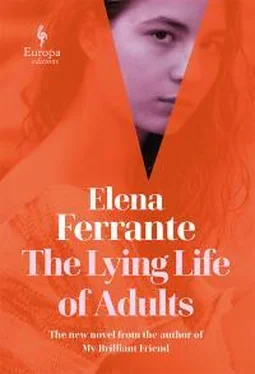
![Элена Ферранте - История о пропавшем ребенке [litres]](/books/32091/elena-ferrante-istoriya-o-propavshem-rebenke-litres-thumb.webp)
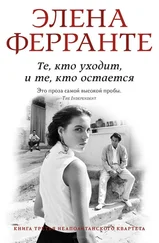
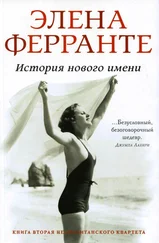
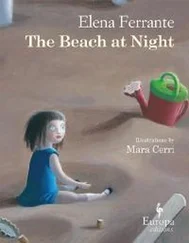
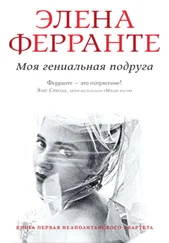
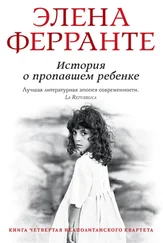
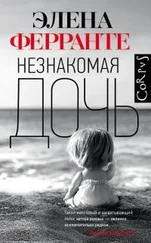
![Элена Ферранте - Дни одиночества [litres]](/books/404671/elena-ferrante-dni-odinochestva-litres-thumb.webp)


